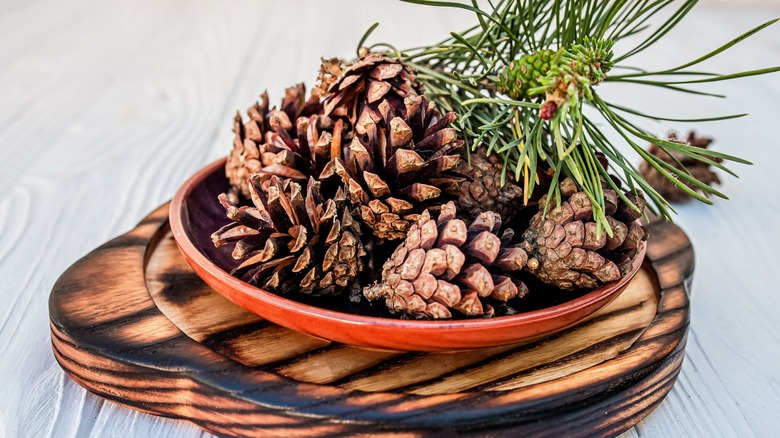Here's Why You Should Bake Your Pinecones Before Decorating With Them
If your fall or winter decor is missing a pinecone or two, can you really say you've decorated for the season? Many home DIYers can attest that beautiful pinecones have so many uses. You can put them on a wreath, on a table centerpiece, or even just throw them in a decorative bowl and voilà: your home will instantly feel more festive. You can even make DIY scented pinecones with a dash of cinnamon or use pinecones in the garden all year round. Despite their many uses, a lot of crafters out there might not realize that you should always bake your pinecones before you use them in projects. This is important to keep you and your family safe while also making the pinecones look their best.
Like most things from the great outdoors, pinecones can be home to bacteria, fungi, and insects, so the number one reason to bake a pinecone is to kill off those things so they don't cause an infestation. Plus, the heat from baking also dries them out so they don't bring in mildew and mold, while at the same time allowing them to open fully so you have big, round, beautiful pinecones for your project. Many crafters also opt to wash their pinecones before baking so they are extra clean. You can also freeze pinecones to kill bacteria and insects if you prefer not to use the oven, but this method takes a little longer and may not open up your pinecones like baking will.
How to prepare pinecones before using them
The first step, of course, is to forage for some pinecones. It's best to pick ones that have already fallen and are slightly open. If you find one that looks fairly fresh and is still closed, you can actually grow a tree from that pinecone instead of using it in a craft. If you prefer, first wash your pinecones in warm water to remove any sap or soak them in a solution of half water and half white vinegar for about 30 minutes. Vinegar can kill some bacteria (but not all) as well as some insects. However, this step is not necessary if you are baking them. After soaking, rinse and allow them to air dry before putting them in the oven.
When you are ready to bake, line a baking sheet with aluminum foil or parchment paper and place the pinecones on it in one layer. Bake them at 250 degrees Fahrenheit for about 30 to 60 minutes, depending on size and how moist they are. Humid or rainy climates will naturally require longer baking times. Keep a close eye on them and turn them if necessary. When they are ready, they will likely be more open and have released most of their seeds. If you do not wish to use your oven, you can opt for freezing the pinecones instead. Simply place them in a plastic bag and put them in the freezer for at least 24 hours before using them around your home.
